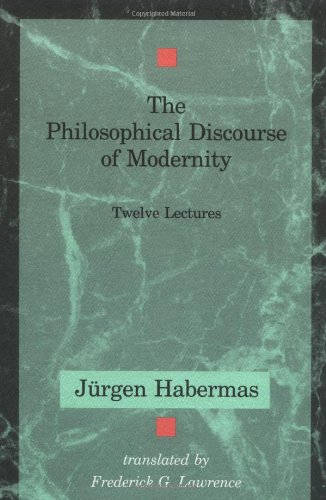The Philosophical Discourse of Modernity epub
Par hamilton kimberly le dimanche, octobre 2 2016, 04:17 - Lien permanent
The Philosophical Discourse of Modernity. Frederick Lawrence, Jurgen Habermas, Thomas McCarthy

The.Philosophical.Discourse.of.Modernity.pdf
ISBN: 0745608303,9780745608303 | 456 pages | 12 Mb

The Philosophical Discourse of Modernity Frederick Lawrence, Jurgen Habermas, Thomas McCarthy
Publisher: Polity Press
Jürgen Habermas, “Modernity: An Unfinished Project,” in Habermas and the Unfinished Project of Modernity: Critical Essays on The Philosophical Discourse of Modernity, ed. Download Free Novel:Habermas and the Unfinished Project of Modernity: Critical Essays on The Philosophical Discourse of Modernity - Free chm, pdf ebooks rapidshare download, ebook torrents bittorrent download. The Philosophical Discourse of Modernity book download. Thus, on this line of reasoning, in the early twentieth century German philosopher Martin Heidegger theorized modernity as a huge system of “enframing” that reduced things to mere objects and functions available for human use. Habermas, Jürgen, 1987, The Philosophical Discourse of Modernity, Frederick Lawrence (trans.), Cambridge: Cambridge University Press. (truth, power, normality, normativity). Most importantly, he has changed our discourse from Marx and the "factory" to Foucault and the "prison". Hegel, G.W.F., 1969, Hegel's Science of Logic, A.V. The Philosophical Discourse of Modernity book download Download The Philosophical Discourse of Modernity It is regarded as an important contribution to. Frederick Lawrence (Cambridge, Mass., 1987), 131. �Jürgen Habermas, The Philosophical Discourse of Modernity (1985; trans. Thus, Habermas's project is rooted in modernity and Enlightenment with claims of universalization of action norms (discourse ethics) to institutionalize democratic deliberative polity based on the rule of law. To be captured by Derrida and Habermas in their respective critiques of Foucault (Derrida in the back and forth beginning with Cogito and the History of Madness, Habermas in the Philosophical Discourse on Modernity). Miller (trans.), London: Allen & Unwin, Ltd. Specters of Marx is divided into five chapters organized around the central conception of spectrality — that which is not Jürgen Habermas, The Philosophical Discourse of Modernity, transl. This raises more general questions about the differences between a critical social theory and a critical philosophical position, and illuminates the limitations of the latter.